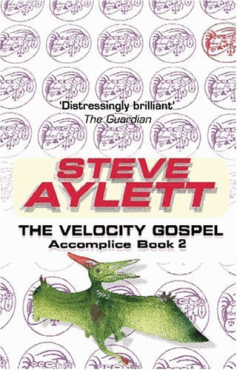This review of The Velocity Gospel (Accomplice Book 2) by Steve Aylett was written in 2002 for the website Infinity Plus.
You may want to read my review of Only An Alligator (Accomplice Book 1) first.
Victor Gollancz, 2002, £9.99, 131pp, ISBN 0-57507-088-9
 You have to be in the right mood for Steve Aylett’s quirky fiction.
You have to be in the right mood for Steve Aylett’s quirky fiction.
If you’re feeling bright and breezy then something like, say, The Velocity Gospel can seem interestingly different, funny and demanding.
If you’ve got a bit of a hangover or you’re just a little tired then the same book can seem pretentious, nonsensical and obstreperously difficult.
So, allowing for me having been in the right frame of mind whilst reading The Velocity Gospel, I quite enjoyed it.
The further adventures of Barny Juno and friends were almost as entertaining as previously – and is it my imagination imposing some order on Aylett’s warped world or is there some measure of political satire in here? Talking of his voters and the need to keep them occupied with anything but politics, Mayor Rudloe cynically suggests: “Convince them they prosper through witnessing prosperity” (page 63).
Surely Aylett wouldn’t let reality intrude into Accomplice, would he?
Anyway, the plot… well, Barny is unaware of being once more pursued by an emissary of the demon king Sweeny – to be fair he has other things on his mind, like trying to break up with his present girlfriend, Magenta Blaze, for new love Chloe Low.
All the familiar bizarre characters from Only An Alligator reprise their original performances: Barny’s curmudgeonly parents, the chef school (motto: ‘Garbage, at crippling prices!’) and his perhaps-not-as-bizarre-as- it-first-appears job at the sorting office where nobody has a clue what to do with the parcels that continually arrive.
I’ve had jobs like that, too.
However, the nagging riptide of doubt sucking the sands of enjoyment away from between my toes was that, postmodern arguments for the value or relevance of literature aside, I can’t quite see the point of the Accomplice series. Well, that’s perhaps a bit harsh; let’s say, rather, that I can’t understand what Aylett is hoping to achieve here.
The ratio of effort to reward is unbalanced in The Velocity Gospel. This is not an easy bedtime read, but given its difficulty, or rather, perhaps, its perplexity (if that’s a legitimate term of literary criticism), there seems to be little real depth here.
Once you’ve finished you can put it aside without a second thought. And, even more disastrously for the second in a four part series, I have no great urge to read part three…
Quite good, but in slightly bad kind of way.
Advertisements Share this:





